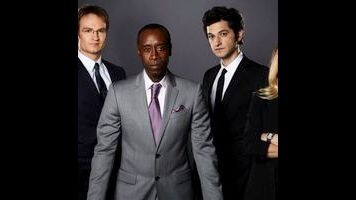House Of Lies: “Prologue And Aftermath”

The further House Of Lies goes, the less I’m able to recall when I thought it could be a good show. Tolerable? Sure. This episode and the past few week’s episodes have been entirely tolerable. No, I’m not talking about a show that Showtime could put alongside Homeland and say “Look, we’re as good as HBO and FX and AMC!” Who knows if that was Showtime’s goal—but it was my hope, based on a good premise and a stellar cast.
Pretty much every House Of Lies review I’ve done since has focused on where the show is failing, but there are two big issues that make it impossible for the show to get better. The first—and most prominently on display in “Prologue And Aftermath”—is an over-reliance on simplistic psychology.
House Of Lies has the trappings of a show that should be able to deal with complexity. Management consultancy isn’t exactly lightweight stuff. The show’s actors are capable of nuance. It revels it its adulthood when it comes to tits, sure enough. But emotions? Nope. It’s stuck in this inane one cause, one effect model.
That model hits Jeannie the hardest of any character in this episode. She has a connection to a megachurch in her hometown of Spokane, so the Pod heads there to seal the deal and learn more about Jeannie. That includes meeting her mother, which Jeannie turns into a way to attack her mom for lying about her dad not being around. I was just complaining about Kristen Bell being too judgmental as Veronica Mars, but she takes that quality to another level in this House Of Lies episode. For example, Jeannie catches her old friend/new client porking someone who’s not his wife, and says “Choose your dick or God.” Which might work if she had any reason to care about the guy (the episode doesn’t make it look that way) or if she’d been presented as anything like a believer before (she hasn’t).
This would be mildly annoying character development on its own, but it turns downright insulting at the end, when Jeannie is shown crying while letting Marco have sex with her. Then he compliments her on getting the deal done in Spokane, and she desperately asks “Are you proud of me?” as if he’s her surrogate father. I suppose House Of Lies is aiming to make this seem creepy, and succeeding, but the creepiness isn’t from “Man, Jeannie is fucked up!” but instead from “Jesus, do the writers actually expect us to believe this shit? Poor Kristen Bell.”
“Prologue And Aftermath” also uses the one cause, one effect model at the very beginning of the episode, when it depicts Roscoe’s 2002 birth using Pop-Up Video as a model, a choice which varies between amusing and insufferable. As Monica goes into labor, Marty swoops in and steals a potential client of hers in the same room. This, apparently, is what caused her to try and destroy him ever since. Did we need an origin story for this relationship?
The second major problem is that House Of Lies believes serialization is the same as character development. The idea that serializing stories—where things change from week to week and characters remember what happened before—makes shows better is remarkably seductive. It’s probably also a good thing to consider in general. But this show just doesn’t seem to be getting it right, possibly because it behaves like the characters aren’t important—just the storylines. Greg Norbert, whose possible conversation was the heart of last week’s episode? Gone. April’s “murder” case? Suddenly present. The merger? Barely mentioned. Roscoe’s custody battle? The most important part. Roscoe himself? Totally missing from this episode. So too is Jeremiah, whose Parkinson’s revelation should have theoretically had some kind of impact.
These two flaws combine in a way that reveals the deep flaw at the core of House Of Lies. Focusing on single causes for characters’ behavior indicates that the show wants its past to make sense. The excess of serialization demonstrates that it’s trying to go somewhere in the future. Both of these things are important, yes, but they’re only important if what’s happening in the present is worth caring about.
Stray observations:
- Your one joke of the night: “She was the sexiest little kid on that stage.” “Sexy seems like the wrong word.”
- “Who does that?” “Me! I’m fucked-up!” Cheadle’s delivery here is so great that I wish it were in the service of something better.